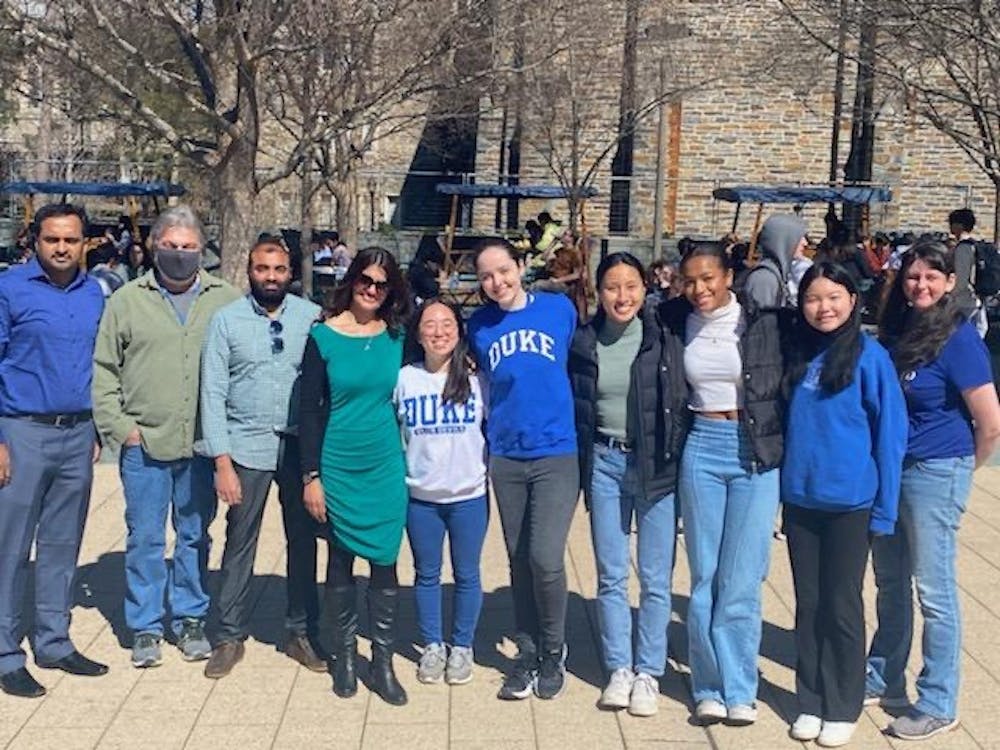A research group at the Duke Cancer Institute is working to expand its community footprint, with students taking the lead.
The Duke Consortium for Inflammatory Breast Cancer aims to improve diagnosis and treatment of the aggressive form of breast cancer through research and education. The group, which originated in the lab of Program Director Gayathri Devi, first met in December 2014 and in recent months has begun more public-facing efforts, including podcast appearances and the formation of a student organization.
“What started as a small seed grant from Duke University School of Medicine dean’s office to form interdisciplinary colloquium dinner meetings to attract faculty, advocates and staff from Duke and local universities led to a nationally and internationally recognized [Duke consortium] with collaborations with international IBC investigators,” Devi, also an associate professor in surgery, wrote in a statement.
Inflammatory breast cancer accounts for 10% of all breast cancer deaths in the United States, with a five-year survival rate of only 35 to 40 percent, according to the Consortium for IBC. Due to its rarity and the fact that it manifests with redness, swelling, pain and other skin changes in the breast, IBC is commonly misdiagnosed. Patients may be erroneously prescribed antibiotics or told to wait and see if symptoms worsen, which delays care.
In the eight years since the consortium’s inception, it has fostered cross-departmental and cross-institutional collaboration, allowing students to engage with patient advocates, caregivers and leaders of advocacy foundations, Devi wrote.
The lab operates on the “benchside to community and back” model, in which the community is kept abreast of ongoing research and their feedback is taken into account.
“We are now using this model to create a larger Rare Cancer Coalition that will have the ability to bring together population health research, involvement of patients and patient advocates, wet lab discoveries, mentorship, education, collaboration and community involvement, so there are a lot of opportunities for students of all different skill sets to be involved,” Research Program Manager Sarah Weaver wrote.
Junior Safiyyah Wilson first joined Devi’s lab after applying through MUSER, Duke’s portal for student research opportunities.
“I was interested in learning more [about inflammatory breast cancer] because I had never heard of it and because it disproportionately affects Black women,” Wilson said. That disparity and the lack of research on inflammatory breast cancer made Wilson’s interest personal, as she is a Black woman herself.
Senior Alexandra Bennion also had her own reasons for getting involved with the CIBC: her mother had breast cancer and experienced a rare recurrence of disease.
“Seeing how translational research saved my own mother’s life, I joined the Devi lab where I began to learn about inflammatory breast cancer,” Bennion wrote.
Bennion’s involvement extends beyond the lab; she received the Dean’s Summer Research Fellowship to pursue further cancer research and is one of the students seeking to launch the Duke Undergraduate Rare Disease Coalition in fall 2022.
The DURDC aims to “raise awareness of rare diseases and “enable students to become rare disease ambassadors within the greater Duke community and beyond,” Bennion wrote. It will also serve as a community for students who have been impacted by rare diseases, either through personal experience or through that of an affected family member.
The organization tabled on Bryan Center Plaza in March to garner interest in the group and raise awareness for inflammatory breast cancer and patient advocacy, raffling off Duke merch in the process.
“Duke’s campus is rich with future healthcare professionals, [and] engaging with these students who are going to pursue medical, [physician assistant], nursing or patient-facing careers is critical in spreading awareness of rare diseases,” Bennion wrote.
Sophomore Hillary Hsu wrote that she joined the DURDC because it brings together students with different interests such as engineering, policy, medicine and research.
“Personally, I was drawn to the environmental aspect of studying how our environment can impact health outcomes,” Hsu wrote, referring to the consortium’s focus area on population health and environmental factors.
According to Weaver, the student organization would allow undergraduates to connect with researchers and advocates at the consortium.
“Because this is a disease with disproportionately higher incidence in younger women [and] Blacks along with poor outcomes, [and it] can be pregnancy associated and affect men too with risk factors determined by disparities in socio-cultural risk factors, it’s crucial to have our youth involved in educating each other about this disease,” Weaver wrote.
Get The Chronicle straight to your inbox
Sign up for our weekly newsletter. Cancel at any time.

Nadia Bey, Trinity '23, was managing editor for The Chronicle's 117th volume and digital strategy director for Volume 118.

